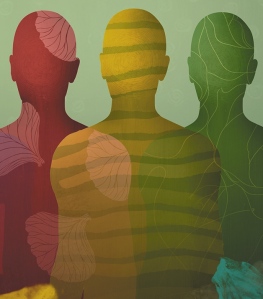
In an effort to remain accountable to communities who have been negatively impacted by past and present medical injustices, the staff at Himmelfarb Library is committed to the work of maintaining an anti-discriminatory practice. We will uplift and highlight diverse stories throughout the year, and not shy away from difficult conversations necessary for health sciences education. To help fulfill this mission, this week’s blog post will cover the School of Medicine and Health Sciences (SMHS) Anti-Racism Coalition (ARC).
The GW Anti-Racism Coalition is working to promote thoughtful conversations and active anti-racism efforts by the medical community. ARC recognizes the “ethnic and cultural diversity of the varied learners in our medical enterprise and their subsequent interaction with and care for an internationally heterogeneous patient population” and is committed to “the development and active implementation of an antiracist academic community to identify and eradicate all forms of racism and ethnic oppression.” While dismantling racism within the medical education community, the subsequent patient interactions and even within our interactions with each other is an enormous undertaking, ARC is committed to doing the difficult and necessary work towards reaching this end goal.
One way the group is developing an antiracist academic community is through the ARC Educational Series, a series of lectures and workshops centered around topics of race, racism, and anti-racism. The next session in this series, entitled Moving Beyond Bystanding...to Disrupting Racism, will take place on Wednesday, February 17, 2021 at 12:00pm-1:30pm. In this bystander training session, Dr. Lanre O. Falusi (MD, FAA), and Dr. Maranda C. Ward (EdD, MPH) will discuss how positions of power and privilege operate in ways that are often taken for granted. Characteristics and challenges of being a bystander and disruptor of racism will be discussed.
On Thursday, February 25, 2021 at 7:00pm, ARC will host a discussion of the film Black Men in White Coats. This documentary examines the systemic barriers that prevent black men from becoming medical doctors and the societal consequences of this fact. The movie will be available for pre-screening from February 22nd through February 25th.
Recordings of past sessions are available on the ARC Educational Series website. Past sessions include:
- Understanding the Connection between Race and Social Determinants of Health
- Medicine, Public Health, and Anti-Racism Activism: The Life and Career of Dr. Virginia M. Alexander
- Race in America Lecture Series: “1619: Reflecting on the Legacy of Slavery in America” - A Conversation with Nikole Hannah-Jones
- How to Talk about Race, Power, and Privilege in Classroom and Clinical Settings
- Structural Racism and Health Professions Education
- “It’s Not You, It’s Me”: Preventing Bias in Personal, Professional, and Patient-Related Interactions
- LGBTQ Health and Policy in the Biden-Administration
- Developing a Dangerous Unselfishness
Links to additional anti-racism resources are also available. Whether you are you a long time-advocate for racial equality and equity, or are new to the plight for racial justice, ARC has resources and educational sessions available that can help facilitate your personal anti-racist growth.

 Medicine Grand Rounds this Thursday, August 11 will focus on What You Need to Know About Your LGBT Patients. This presentation by Shane Snowdon, MA, founding director of the Center for LGBT Health & Equity at the University of California San Francisco, will discuss what LGBT people experience in health care – and how providers can be as comfortable and knowledgeable as possible in working with this long-overlooked group of patients.
Medicine Grand Rounds this Thursday, August 11 will focus on What You Need to Know About Your LGBT Patients. This presentation by Shane Snowdon, MA, founding director of the Center for LGBT Health & Equity at the University of California San Francisco, will discuss what LGBT people experience in health care – and how providers can be as comfortable and knowledgeable as possible in working with this long-overlooked group of patients.
